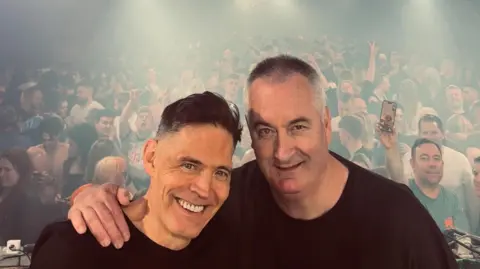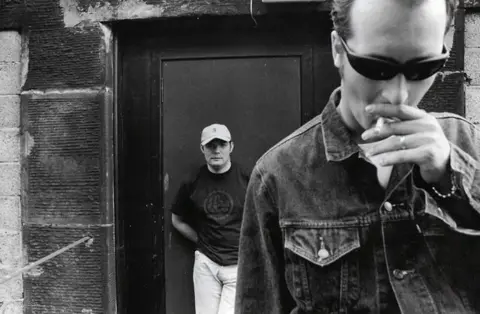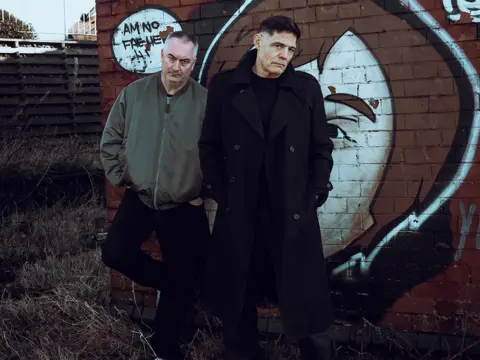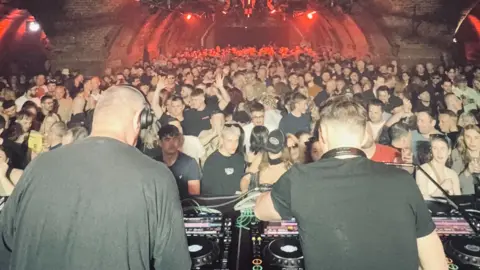'It's about the music' - DJ duo Slam celebrate 35 years
 Soma Records
Soma RecordsUnder the red-brick Victorian railway arches of Glasgow's Platform venue, the familiar thud of techno reverberates around the walls.
Dancers move closely together, immersed in the repetitive beats as pioneering DJ duo Slam mark 35 years of shaping Scotland's electronic music scene.
For decades this building, formerly known as The Arches, was home to Slam's renowned parties.
Over the years, they welcomed some of the biggest names in the industry to the venue, including Fatboy Slim, Boys Noize and Nina Kraviz.
Now Stuart McMillan and Orde Meikle are back where it all began.
Playing all night long in the infamous tunnels, they sound just as fresh as when they first formed the duo.
 Soma Records
Soma Records"I'm proud of still having the enthusiasm that I had when we started doing it," said McMillan.
"It certainly doesn't feel that long."
Slam have witnessed club culture evolve in countless ways over the past 35 years but they say the essence remains unchanged.
"To me, it's just a DJ and a bunch of people in a dark room," McMillan said.
"The music can be different throughout time... but essentially, it's something quite tribal. It's the same."
Their longevity is rooted not in chasing music trends, but in carving out their own path.
"Sometimes I just back away from trends because if it's a trend, to me it says it's not going to last," McMillan said.
"When you've been doing it for this long it's not a good look to jump on every new trend that comes along.
"I think by this stage, you should have forged your vibe by now."
 Soma Records
Soma RecordsThe duo released their new album, Dark Channel, last week.
They describe it as a fierce, club-focused record that channels decades of experience into a reflection of the "fractured, chaotic" world we now inhabit.
McMillan sees the album as a response to turbulent times, with the dance floor offering unity in the face of division.
"I think we are going into a time now where there is discourse, wars, people arguing with each other, a big divide between where people sit on the political spectrum," he said.
"I guess the only sanctuary for that, a space where people are coming together, is on the dance floor.
"I think that's a beautiful thing and I think that needs to be celebrated, and the album is a tribute to that."
 Soma Records
Soma RecordsSlam's belief in the power of club culture goes beyond music.
They recalled how when they first started going clubbing in the late 1980s, dance floors played a key role in uniting people.
"When acid house came in 1988, people stopped fighting at football, which I think is amazing," said McMillan.
"To see them together on the dance floor was unheard of at the time," Meikle added.
Slam also continue to influence the scene through their label, Soma Records.
Founded in 1991, Soma helped launch the careers of countless artists - including Daft Punk, long before their global breakthrough.
"A big part of our thing is to bring new artists through," McMillan added.

Meikle said: "We've always tried to look for something that sounds fresh or new or different.
"It's never been about how much money we will make, how popular it will be.
"It's about the music, and it's been like that from day one."
McMillan joked: "Commercially, I'm the worst A&R man in history."
Many also associate Slam with their events, especially the Slam Tent which they ran at T in the Park.
A comeback was on the cards after the Covid lockdowns, but logistical issues meant plans fell through.
However, the pair haven't ruled out bringing back the Slam Tent in some way.
"It's something we would love to do. It's not off the table," they said.
"Watch this space."
